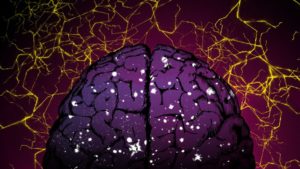Choline is used by the body to produce acetyl-choline, an important neurotransmitter essential for brain and nervous system functions including memory, muscle control and mood
The article linked and excerpted below is important for two reasons- it highlights an inexpensive nutritional supplement-choline- shown to fight Alzhiemer’s Disease (AD) and the article points to therapies that can effect epigenetics- how genes express themselves.

I underwent aggressive conventional oncologic therapies in ’95 and ’96. Among other long-term side effects I have what is only half-jokingly refered to as chemo brain. Further, I am in my late fifties and worry about my brain health as I head into my golden years.
While there is mild age-related dementia in my family there are no diagnoses of Alzheimer’s Disease. So enhancing my brain health is a ongoing priority for me and has been for years now. I supplement daily with something called Cognitex Basics by Life Extension. The primary ingredients are choline (250mg) and phosphatidylserine (100 mg).
While my primary concern is healing my chemotherapy-induced cognitive dysfunction aka chemobrain, I do worry about my brain health long-term. I think that choline and phosphatidylserine ( Cognitex Basics) supplementation have made a significant difference in how well my brain works.
Also, I also eat nutritiously, exercise, and supplement with other brain healthy supplements. I focus on my brain health.
Have you been diagnosed with AD? Early onset AD? Just trying to enhance your brain health like me? Scroll down the page, post a question or comment and I will reply to you ASAP.
To Learn About Healing Chemo Brain- click now
Thank you
David Emerson
- Multiple Myeloma Survivor
- MM Cancer Coach
- Director PeopleBeatingCancer
Recommended Reading:
“The study focuses on mice bred to display AD-like symptoms. Results showed that when these mice are given high choline in their diet, their offspring show improvements in spatial memory, compared with those receiving a normal choline regimen in the womb.
Remarkably, the beneficial effects of choline supplementation appear to be transgenerational, not only protecting mice receiving choline supplementation during gestation and lactation, but also the subsequent offspring of these mice.
While this second generation received no direct choline supplementation, they nevertheless reaped the benefits of treatment, likely due to inherited modifications in their genes.
The exploration of such epigenetic alterations may further exciting new avenues of research and suggest ways of treating a broad range of transgenerational afflictions, including fetal alcohol syndrome and obesity…
Choline acts to protect the brain from Alzheimer’s disease in at least two ways, both of which are explored in the new study. First, choline reduces levels of homocysteine, an amino acid that can act as a potent neurotoxin, contributing to the hallmarks of AD: neurodegeneration and the formation of amyloid plaques.
Homocysteine is known to double the risk of developing Alzheimer’s disease and is found in elevated levels in patients with AD. Choline performs a chemical transformation, converting the harmful homocysteine into the helpful chemical methionine.
Secondly, choline supplementation reduces the activation of microglia—cells responsible for clearing away debris in the brain. While their housekeeping functions are essential to brain health, activated microglia can get out of control, as they typically do during AD. Over-activation of microglia causes brain inflammation and can eventually lead to neuronal death. Choline supplementation reduces the activation of microglia, offering further protection from the ravages of AD…
Alzheimer’s disease is now believed to begin its path of destruction in the brain decades before the onset of clinical symptoms. Once diagnosed, the disease is invariably fatal, shutting down one vital system after another. Mental decline is relentless, with patients experiencing a range of symptoms that may include confusion, disorientation, delusions, forgetfulness, aggression, agitation, and progressive loss of motor control…
Research into the origins of Alzheimer’s disease strongly suggests that a great variety of factors are at play. While advancing age remains the greatest risk factor, other hazards that have been implicated in the disease include genetic predisposition and lifestyle.
To this end, studies suggest that diet can have a significant effect in increasing or lowering the risk of cognitive decline, and the risks may be transmitted across generations…
Choline is used by the body to produce acetylcholine, an important neurotransmitter essential for brain and nervous system functions including memory, muscle control and mood. Choline also plays a vital role in regulating gene expression...
“We studied 51 patients meeting clinical criteria for probable Alzheimer’s disease (AD). Patients were treated for 12 weeks with a formulation of bovine cortex phosphatidylserine (BC-PS; 100 mg t.i.d.) or placebo, and those treated with the drug improved on several cognitive measures relative to those administered placebo.
Differences between treatment groups were most apparent among patients with less severe cognitive impairment. Results suggest that phosphatidylserine may be a promising candidate for study in the early stages of AD…”
APPIP ERROR: amazonproducts[
AccessDeniedAwsUsers|The Access Key Id AKIAJAJ37JVNL7OUU4CA is not enabled for accessing this version of Product Advertising API. Please migrate your credentials as referred here https://webservices.amazon.com/paapi5/documentation/migrating-your-product-advertising-api-account-from-your-aws-account.html.
]




